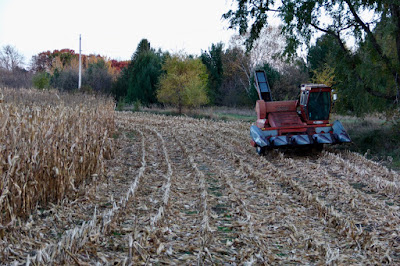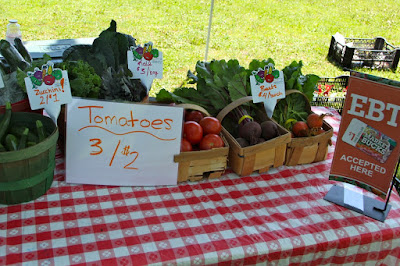We're going to try something a little different today. For quite a while we've been struggling with the idea that conversations, in writing, oral, or other, about "agriculture" are really about two different but interrelated and intermixed(?) systems. One system is what is often referred to as "industrial agriculture," dominated by commodity row crops such as corn and soy and concentrated animal feeding operations [CAFOs]. Much of what is produced in that system yields exports and/or industrial feed stocks. The other system produces real food, largely from smaller to mid-size and often local farms. In many, but not all, instances I believe we use to call them "truck farms."
We're wondering if we can better get our head around some of the confusion we sense by looking at definitions. Today we're going to extract some definitions from Wikipedia and see what that leads to and where it leaves us. [YMMV]
Agriculture
Agriculture is the science, art and practice of cultivating plants and livestock.[1]
 |
| local agriculture
Photo by J. Harrington
|
Further down the page linked above, which, we note, equates agriculture with farming, is a paragraph that contributes substantially to our [at least my] confusion.
The major agricultural products can be broadly grouped into foods, fibers, fuels and raw materials (such as rubber). Food classes include cereals (grains), vegetables, fruits, oils, meat, milk, fungi and eggs. Over one-third of the world's workers are employed in agriculture, second only to the service sector, although in recent decades, the global trend of a decreasing number of agricultural workers continues, especially in developing countries where smallholding is being overtaken by industrial agriculture and mechanization.
Based on the above, we note that we were partially correct but that there remains a lack of clarity in distinguishing among foods and fuels and raw materials since the commodity crops are used to produce foods for humans and animals, as well as fuels and raw materials in things like "bioplastics." Perhaps we should take a quick look at a definition of a food system, since food for people is our primary area of interest.
local food
Photo by J. Harrington
Food system
The term food system is used frequently in discussions about nutrition, food, health, community, economic development and agriculture. A food system includes all processes and infrastructure involved in feeding a population: growing, harvesting, processing, packaging, transporting, marketing, consumption, distribution and disposal of food and food-related items. It also includes the inputs needed and outputs generated at each of these steps.
This obviously has all the clarity of Congress trying to define "assault weapon" and "large capacity magazine." Unfortunately, one of our favorite resources about the kind of food and farming systems in which we are most interested doesn't distinguish among agriculture, farming and food systems in the lexicon of Local: The New Face of Food and Farming. Since we haven't reviewed that resource for years now, today's posting has left us in a better place than we began, even if we haven't reached a satisfactory conclusion, we've made progress and may make more after we've again reviewed the lexicon. Most days some progress is all we can hope for. If you're curious about the lexicon of sustainability and local food, read this after you've read Wendell Berry's vision.
Work Song Part II - A Vision (Epilogue)
(From "New Collected Poems" by Counterpoint)
If we will have the wisdom to survive,
to stand like slow growing trees
on a ruined place, renewing, enriching it…
then a long time after we are dead
the lives our lives prepare will live
there, their houses strongly placed
upon the valley sides…
The river will run
clear, as we will never know it…
On the steeps where greed and ignorance cut down
the old forest, an old forest will stand,
its rich leaf-fall drifting on its roots.
The veins of forgotten springs will have opened.
Families will be singing in the fields…
Memory,
native to this valley, will spread over it
like a grove, and memory will grow
into legend, legend into song, song
into sacrament. The abundance of this place,
the songs of its people and its birds,
will be health and wisdom and indwelling
light. This is no paradisal dream.
Its hardship is its reality.
– Wendell Berry
********************************************
Thanks for visiting. Come again when you can.
Please be kind to each other while you can.


No comments:
Post a Comment